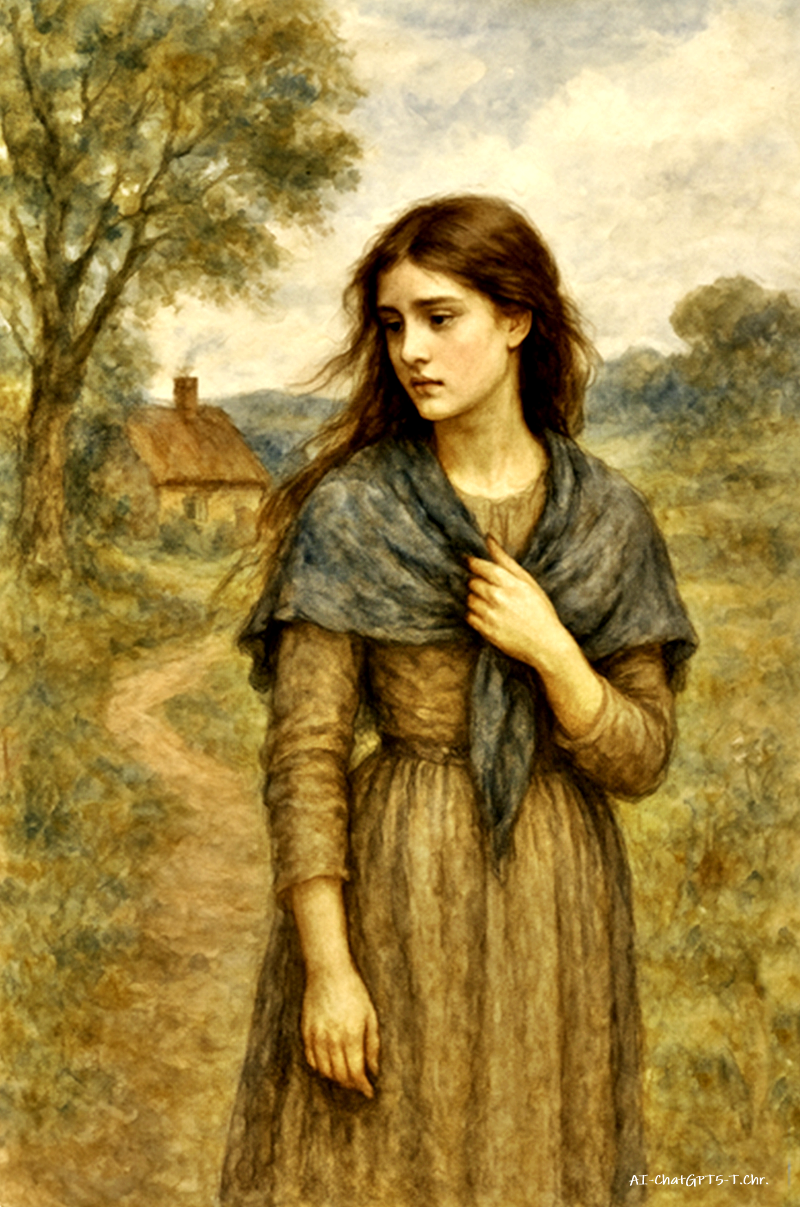A Pure Woman Faithfully Presented

AI-ChatGPT5-T.Chr.-Human Synthesis-23 September 2025
The Spark of Ancestry
The May-Day sun had long disappeared behind the hedgerows, leaving the sky painted in gentle violets and fading gold. Tess Durbeyfield walked along the narrow lane from the village dance, her skirts brushing the wildflowers and grasses that clung stubbornly to the ditch sides.
The air was rich with the scent of damp earth, blossoming hawthorn, and lingering laughter from the evening revelers. Every step seemed both familiar and strange, for she carried within her a restless longing she could scarcely define.
Her father, John Durbeyfield, waited at the lane’s turn, puffing from the brisk walk and the excitement of news he had heard. His face, round and flushed with pride, bore the unsteady gleam of ale.
“Tess, we are gentlefolk!” he declared. “D’Urbervilles! Kings and knights flow in our veins!”
Tess smiled faintly, thinking instead of her mother’s drawn, pale face and the children’s patched clothes. Nobility could not mend worn shoes or fill empty stomachs. Yet the word “d’Urberville” shone with dangerous promise, as if it were a spark that might light the way to a world both alluring and perilous.
At home, she lay awake on the rough pallet beside the hearth. The wind whispered through cracks in the walls, mingling with the soft breathing of her siblings. Her thoughts wandered over a future she barely dared to hope for: wealth, respect, freedom. But a shadow clung to these dreams, a silent warning that life’s beauty was often coupled with betrayal and pain. The hearth fire’s dull glow seemed to pulse with the weight of her destiny, a dim omen of the trials to come.
The House of the d’Urbervilles
The road to Trantridge stretched through winding lanes lined with gnarled elms and thick hedgerows. Tess rode stiffly on the rough cart, the wind tugging at her homespun dress, her eyes fixed on the distant mansion. From afar, the house seemed noble and grand—tall chimneys, slate roofs, gardens ablaze with roses, tulips, and ornamental shrubs. Yet as she approached, a subtle unease grew. Everything appeared arranged with exacting precision; the air itself seemed rehearsed, its elegance a brittle mask.
Inside, the house was a labyrinth of polished floors, gilded mirrors, and corridors faintly scented with lavender and dust. The blind mistress sat in her high chair, issuing commands with absolute authority, while servants moved like clockwork through the rooms. Tess tended the birds, her small hands careful, and felt a gnawing discomfort she could not name. Beneath this surface of order, the air thrummed with an unseen tension, a fragile calm that threatened to shatter with the slightest misstep.
Alec d’Urberville moved like a storm beneath the calm. Handsome in a way that demanded attention, he walked with smooth, almost predatory grace. His eyes followed her closely, and he spoke just enough to draw her glance. One evening, in the rose garden, the sun casting long shadows across the petals, he said:
“You are of my blood, and what is mine by kinship I cannot let the world take.”
Tess recoiled instinctively, her pulse racing. His words were polite, almost tender, but something hidden beneath them suggested danger. She remembered her mother’s hopes of fortune, her father’s newfound pride, and the grinding poverty of her childhood. The house, with all its elegance, became a cage, each corridor closing around her in quiet menace.
On a pale moonlit night, her courage broke, and Alec’s manipulation triumphed. She left the house silently, carrying the first deep burden of shame and sorrow. The roses seemed to close their petals in sympathy, and the wind whispered through the branches, mourning the loss of innocence. That night became a shadow she would carry through the rest of her life, a memory of beauty, false security, and the moment her innocence was betrayed.
The Valley of Humiliation
Returning home, Tess walked beneath a pale sky, the fields appearing smaller, the village roads narrower, the air thick with whispers. She bore herself with quiet dignity, yet everywhere she went she felt the sting of judgment. Her mother’s eyes were a mixture of reproach and pity:
“Why did you not see it through, my girl?”
Her father, however, flaunted the family’s newly discovered noble lineage to any who would listen, while the roof sagged and her younger siblings shivered in the cold. Tess lay awake at night, hearing the wind whistle through the eaves, imagining the invisible eyes of neighbors and townspeople observing her every move. Society’s pity proved far harsher than outright scorn; the village seemed to measure her worth not by character but by circumstances beyond her control. She felt small, a fragile creature against a world determined to crush innocence under the weight of expectation and prejudice.
The Dairy at Talbothays
Spring brought Tess to Talbothays Dairy, a valley of flowing rivers, green meadows, and the lowing of cows echoing through the morning mist. The work was honest, repetitive, and offered some solace to her weary spirit. The smell of fresh hay, damp earth, and milk permeated the air.
It was here she met Angel Clare, a young man whose thoughtful manner and contemplative eyes distinguished him from the ordinary villagers. He watched her, not with judgment but with quiet curiosity and respect. Others admired him, but Tess alone captured his attention. Together they worked, she tending the cows and he observing the land or assisting where needed, their companionship deepening through shared labor and the rhythm of the dairy.
Occasionally, Angel spoke:
“Miss Durbeyfield, the world seems brighter when you are in it.”
Tess’s lips curved with a faint smile, warmth rising in her chest. The valley, with its soft mists, golden sunsets, and gentle rivers, became a fragile sanctuary, a place where she could begin to reclaim some measure of peace. Each day strengthened the bond between them, not in words but in small acts of shared work, the quiet moments that stitched together the fabric of a tentative happiness.
The Flight of Innocence
The tenderness that had grown between Tess and Angel Clare blossomed with the passing of the spring and summer at Talbothays. Every morning she rose with the first light, hearing the soft murmur of the river and the distant lowing of cattle, feeling a fragile joy in the rhythm of honest labor. Their hands sometimes brushed as they worked the fields, their eyes met in quiet understanding, and in those moments, Tess allowed herself to dream of a life unburdened by shame.
But the evening of their marriage brought the weight of truth. Tess, trembling yet resolute, disclosed her history with Alec. She spoke quietly, each word measured, her eyes seeking in Angel’s gaze a reflection of understanding.
“Angel,” she whispered, “I must tell you all… of my past.”
He drew back as if the wind had blown against him with force. The world of principle, of rigid moral expectation, gripped him tightly. His love, real though it was, seemed insufficient to overcome the shock of her confession. When dawn broke, he left, his figure receding along the lane, leaving Tess alone in the quiet room, a hollow ache filling the space where hope had briefly lived.
Tess remained behind, carrying both grief and enduring love, aware now that the past would forever cast its shadow over her life. The once-promising sanctuary of Talbothays seemed distant, as if the valley itself had turned its back upon her, reminding her that the world judged not by character but by circumstance.
The Return of Shadows
Winter descended harshly upon the countryside, draping fields and meadows in frost. Tess labored from dawn to dusk, her hands cracked by cold and toil, her spirit bent beneath the weight of circumstance. Each day was a repetition of struggle, the rhythm of work at the dairy both a solace and a reminder of the life she had lost.
Then Alec reappeared. He spoke first of regret, of repentance, his voice smooth, persuasive. But gradually, the predatory persistence she had known before returned. He found ways to intrude, subtle yet unrelenting, until exhaustion and fear forced Tess into a grim acquiescence.
Through it all, Liza-Lu, her younger sister, watched silently. She absorbed the lessons of courage, endurance, and moral fortitude from Tess’s suffering. In Liza-Lu’s observant eyes, Tess saw a reflection of her own innocence and strength—a promise that someone might one day live free from the oppression of cruel fate, a testament that suffering could cultivate resilience and quiet dignity.
The bleak winter winds and the hard frost mirrored the hardness of the world around her, but in her mind, Tess nurtured a fragile flame of hope, even if it flickered under the constant pressure of hardship. Each day she reminded herself of Angel’s love, now distant and unattainable, a memory of warmth against the bitter chill of reality.
The Last Light
When Angel returned, the sight of him at first brought hope, bright and fragile as the first sunlight on a winter morning. He was gaunt, weary, repentant, bearing the weight of his own remorse. Yet the freedom he had returned to find had been curtailed; Tess was bound by circumstance, shackled not by chains but by the relentless pressures of poverty, social judgment, and the lingering shadow of Alec.
In desperation, Tess acted. Alec was slain, not in rage but as an act of final liberation. The act freed her body, if not her soul, and the brief days that followed were filled with a fragile, stolen intimacy. She and Angel wandered across heath and meadow, sleeping beneath the stars, speaking little, their joy measured in stolen breaths. The vastness of the landscape reflected the vastness of what they had lost and yet briefly reclaimed—the freedom of love, fragile and fleeting, set against the cruelty of fate.
At dawn one morning, they reached the standing stones of Stonehenge. The stones rose silently, eternal witnesses to the mortal struggles of humankind. Tess surrendered, serene and resolute, pressing Angel’s hand into Liza-Lu’s.
“Protect her,” she whispered, her voice a mixture of sorrow and hope.
The sky flushed crimson as she was led away, leaving Angel and Liza-Lu to face the stark reality of life’s cruelty. The winds blew cold across the heath, carrying away with them the brief warmth of happiness, leaving only the echo of love and endurance.
Philosophical Closing
Tess Durbeyfield’s life ended not by sin, but by the relentless judgment of society—a world that measured women not by character but by the circumstances imposed upon them. Hardy’s narrative leaves an enduring message: true purity resides not in outward innocence or social approbation, but in steadfastness of heart, in fidelity to love, and in the courage to endure suffering with dignity.
Through Tess’s brief, tragic existence, the reader witnesses the collision of innocence with cruelty, of human strength with inevitable misfortune. Her story is a testament to the resilience of the human spirit, a reflection on the arbitrary severity of fate, and a recognition that the heart’s true worth cannot be dictated by society.
Though she perished, something incorruptible remained. Tess’s moral integrity, her unwavering love, and her silent courage persisted, leaving a legacy beyond the finality of death—a pure woman, faithfully presented, whose story endures as both a warning and an inspiration. Life may be cruel, but within its trials can be glimpsed a quiet dignity, a moral truth that transcends circumstance, and in Tess Durbeyfield, Hardy immortalized that truth with unflinching compassion.
